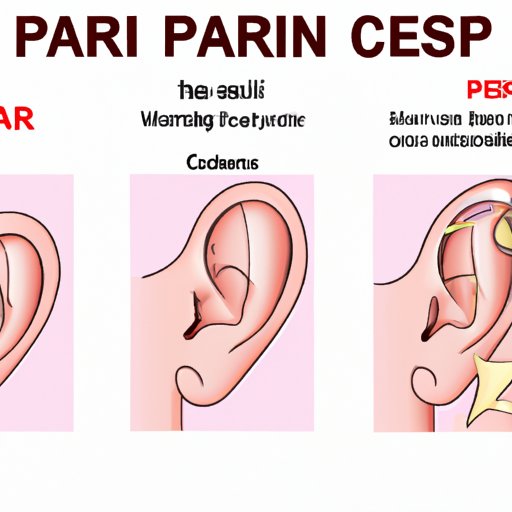
Introduction
Do you ever feel like your ears are clogged and need to be “popped”? This sensation can be uncomfortable and frustrating, but the good news is that there are safe and effective ways to relieve ear pressure and pop your ears. In this article, we will explore the anatomy of the ear, various ear popping techniques, natural remedies, and tips for ensuring that you pop your ears safely and effectively.
Understanding the Anatomy of the Ear: A Guide to Popping Your Ears Safely
To know how to pop your ear safely, it’s important to understand the anatomy of the ear. The ear is a complex organ that includes the outer ear, middle ear, and inner ear. The middle ear is connected to the back of the throat by a narrow passageway called the Eustachian tube. This tube regulates the pressure in the middle ear, so it’s important to keep it open and functioning properly to avoid discomfort and even hearing damage.
Simple Techniques to Relieve Ear Pressure and Pop Your Ears Quickly
If you are experiencing ear pressure and the need to pop your ears, there are several simple techniques that can help. One of the most effective is the Valsalva maneuver, which involves closing the mouth and nose and then trying to exhale gently. This can help to equalize the pressure in the middle ear and relieve discomfort.
Other simple techniques that can relieve ear pressure include swallowing, yawning, and chewing gum. These actions can also help to open up the Eustachian tube and promote the exchange of air and pressure between the middle ear and throat.
Mastering the Art of Ear Popping: Tips and Tricks for Perfecting the Technique
Proper technique is essential for ear popping to be effective and safe. To pop your ear effectively, try to pinch your nostrils and then blow gently through your nose while keeping your mouth closed. This method of popping your ears works by forcing air up the Eustachian tube and into the middle ear.
To make ear popping easier, try tilting your head to one side, as this can help to open up the Eustachian tubes. You can also try using a hot compress or inhaling steam to help release pressure and clear out your sinuses.
If you struggle with ear popping, there are some additional techniques that may help. For example, you can try moving your jaw from side to side or listening to music through headphones to help stimulate the muscles in your ear and reduce tension.
Natural Remedies for Ear Popping: How to Clear Your Ears Without Medication
While over-the-counter medications can be effective in relieving ear pressure, there are also natural remedies that can be just as effective. One of the most natural remedies for clearing your ears is steam. Steam can help to loosen mucus and relieve pressure in the middle ear.
Other natural remedies for ear popping include using essential oils or herbal remedies. Some essential oils, such as eucalyptus oil and lavender oil, can help to reduce inflammation and promote relaxation. Similarly, herbal remedies like chamomile tea or ginger tea may help to ease discomfort and promote healthy sinuses.
The Do’s and Don’ts of Popping Your Ears: What You Need to Know to Avoid Damage
Popping your ears can be safe and effective if done correctly, but there are some things to keep in mind to avoid injury. It is important to avoid popping your ears too forcefully or frequently, as this can damage the Eustachian tube and even cause hearing loss.
It is also important to avoid using sharp objects to try to pop your ears, as this can be dangerous and lead to serious injury. If ear popping techniques are not working, seek help from a professional.
When to See a Doctor for Ear Popping: Understanding the Risks and Warning Signs
While ear popping is generally safe, there are times when it may be necessary to seek medical attention. If you experience pain, dizziness, hearing loss, or any other unusual symptoms associated with ear popping, see a doctor right away.
In addition, if you have a history of ear infections or any other ear-related conditions, it is important to talk to your doctor before attempting to pop your ears.
Conclusion
Ear popping can be uncomfortable, but with the right techniques and remedies, it can be relieved safely and easily. By understanding the anatomy of the ear, using proven techniques, and seeking help when necessary, you can successfully pop your ears and relieve pressure without causing harm.





